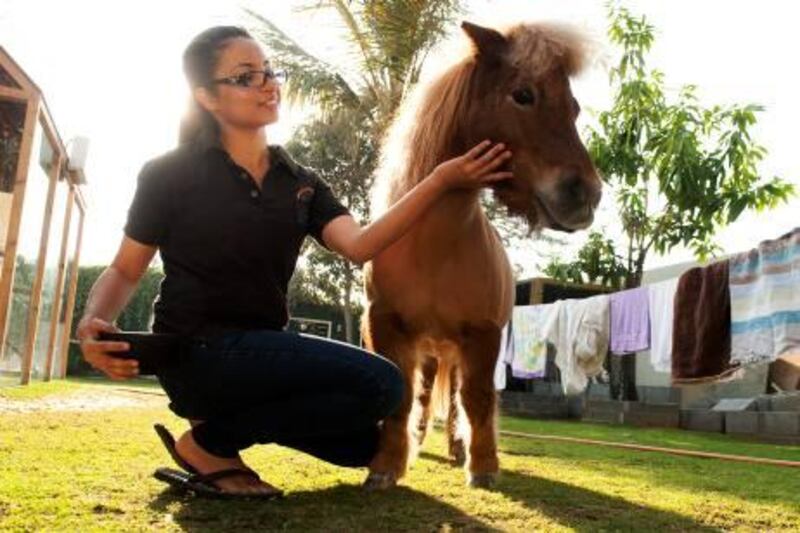After 14 years spent taking care of thousands of abused and abandoned exotic animals, Ayesha Kelaif is hoping the new year brings a new venue for the Shetland ponies, alpacas, deer and gazelles that are grazing on her lawn.
Mrs Kelaif, who runs the Dubai Animal Rescue Centre (Darc), has outgrown her Al Barsha villa, which has become home to 280 animals of all shapes and sizes.
"You have to be really committed to do it, but I love what I am doing because it gives me so much pleasure and happiness," the 47-year-old Emirati said.
The mother of three, who is mourning the sudden death of her husband last week, started her rescue sanctuary after taking in a stray cat, which she named Crystal, in 1997. She now has animals taking over every inch of her 12,000 square foot villa, many of them exotic and endangered species that have been abused and abandoned by their owners.
They include meerkats, a boa constrictor, African tortoises, Patagonian mara hares, an eagle owl, spotted deer, South African gazelles, iguanas, Australian sugar gliders, wild turkeys, ferrets, parrots, chinchillas, a Brazilian marmoset, a Sykes monkey and a handful of abandoned cats and dogs.
Mrs Kelaif, who runs the centre with her daughter, Sara, is hopeful of being granted land outside Dubai from the Government, as well as a proper operating licence.
"We are almost there, thankfully they are being very supportive."
When Mrs Kelaif is not cleaning up after the animals or feeding them, she is working at her full-time job at the Dubai Electricity and Water Authority.
"I spend 70 per cent of my salary on the animals; we have a lot of food and vet bills, and all the animals require different meals and medicine," she said.
She relies on the help of a group of volunteers, many of whom are Emirati students, who come twice a week to the centre to clean the animals' pens, paint the cages and walk the dogs.
She also receives donations from pet stores, including Pet's Delight and Urban Tails Pet Resort, that contribute to the bills.
Every creature at the centre has a story. Mrs Kelaif recently found a dog that had been abused before being tied to a tree and left for dead in the desert. When the animals are dumped, often literally, on her doorstep, she nurses them back to health and tries to find space for them in her sanctuary. When that is not possible, she relies on the Abu Dhabi and Sharjah wildlife centres, although the latter only accepts animals native to the UAE.
"These centres take the animals that we just can't handle," said Mrs Kelaif. She has sent 53 animals to the Abu Dhabi Wildlife Centre, which rehabilitates lions, tigers and cheetahs that are often bought as pets from illegal dealers.
This weekend a two-month-old female cheetah was briefly advertised on Dubizzle.com for Dh30,000, and in May a man was arrested in Bangkok after boarding a plane to Dubai with baby leopards and other young exotic animals in his suitcases.
Reports have shown that Dubai has a vibrant trade in exotic species, often endangered and mostly imported in violation of the Convention on International Trade in Endangered Species of Wild Fauna and Flora and UAE law.
Under the law, potential owners of exotic and dangerous animals must obtain a permit from the Ministry of Environment and Water, which monitors the origin and care of these animals. But many bypass this process.
According to Mrs Kelaif, big cats are the most popular for pets. "Lots of people have them, and it is not only Emiratis, you'd be surprised how many expats have them too. The people who sell these animals will do anything to make money, but it's the people who buy them who make their trade viable," she said.
The only way to put a stop to the illegal trade of wild animals is through education, Mrs Kelaif said. "There's a lack of awareness here because the UAE is a very new country. Luckily, I can see the younger Emirati generation is quite open to new ideas."






